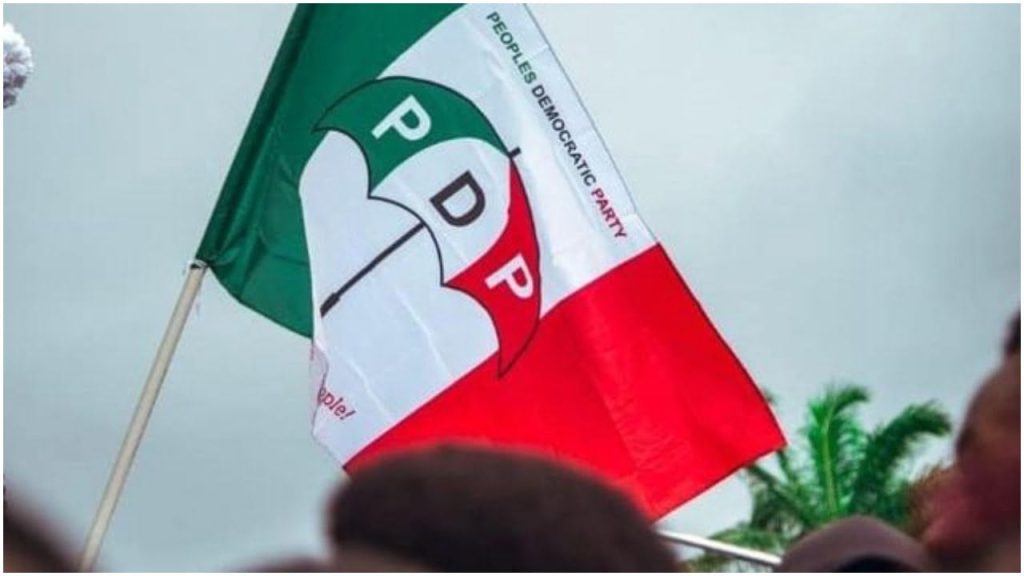The Peoples Democratic Party (PDP) finds itself embroiled in a power struggle with the Independent National Electoral Commission (INEC) over the legitimacy of its upcoming National Executive Committee (NEC) meeting. The PDP, struggling to regain its footing since its 2015 electoral defeat, insists on proceeding with the meeting scheduled for June 30th, asserting that INEC lacks the authority to interfere in the party’s internal affairs. At the heart of the dispute lies INEC’s rejection of the PDP’s meeting notification, citing a procedural requirement for co-signatures from both the national chairman and national secretary. This demand exacerbates existing internal rifts within the PDP stemming from a protracted dispute over the national secretary position, a role currently occupied by two contending individuals: Sunday Udeh-Okoye and Samuel Anyanwu. The PDP maintains that INEC’s role is limited to receiving notifications for conventions, congresses, or primaries where party officers or candidates are elected, not regular NEC or National Working Committee (NWC) meetings.
The PDP’s internal turmoil regarding the national secretary position has been a recurring challenge. The contest between Udeh-Okoye and Anyanwu, the latter backed by influential figures like Federal Capital Territory Minister Nyesom Wike, has repeatedly stalled the party’s progress, including delaying NEC meetings crucial for strategic decision-making. In an attempt to navigate this impasse, the party appointed Setonji Koshoedo as acting national secretary. However, a fact-finding committee subsequently confirmed INEC’s recognition of Anyanwu as the substantive national secretary, further complicating the issue and setting the stage for the current clash with INEC. The PDP argues that the meeting’s purpose, as communicated to INEC, was to assess preparations for the upcoming national convention, not to elect officers, conduct primaries, or nominate candidates, thereby falling outside INEC’s purview.
The PDP accuses INEC’s Acting Secretary, Halilu Aminu, of overstepping his authority by unilaterally assigning a purpose to the meeting beyond what was stated in the official notification. The party questions Aminu’s motives, suggesting a potential agenda to stifle opposition and pave the way for a one-party state, a scenario the PDP vehemently rejects. They highlight previous instances where INEC accepted notifications without demanding dual signatures and even accommodated requests to reschedule events, further underscoring the perceived inconsistency in INEC’s current stance. The PDP warns that INEC’s actions could have far-reaching consequences, undermining democratic processes and eroding international confidence in the electoral body’s impartiality.
The PDP’s 99th NEC meeting, held previously, laid the groundwork for the upcoming 100th meeting, including establishing zoning and convention committees. The party emphasizes that the June 30th meeting is crucial for reviewing the progress of these committees and coordinating preparations for the national convention, a critical step in the party’s rebuilding efforts. The ongoing consultations with various party organs and stakeholders necessitate this meeting, further solidifying the PDP’s resolve to proceed as planned. The PDP argues that INEC’s interference in this internal matter is not only unwarranted but also sets a dangerous precedent for future interactions between political parties and the electoral body.
The PDP, therefore, frames the dispute as a fight for its autonomy and a defense against perceived attempts to suppress opposition voices. They view INEC’s actions as a blatant disregard for established legal precedents and the party’s constitutional rights. The party maintains that its internal affairs, including the scheduling and agendas of NEC meetings, are solely within its jurisdiction, and INEC has no authority to intervene. The PDP’s strong response, questioning Aminu’s motivations and warning of the potential consequences for Nigerian democracy, indicates a firm commitment to challenging INEC’s stance and asserting its right to self-governance.
The PDP’s accusations against INEC raise concerns about the potential politicization of the electoral process and the importance of maintaining a clear separation between the regulatory body and the internal operations of political parties. The party’s insistence on holding the NEC meeting as scheduled, despite INEC’s objections, underscores its determination to resist what it perceives as an overreach of authority. The outcome of this standoff will likely have significant implications for the PDP’s internal dynamics and its efforts to rebuild its standing in the Nigerian political landscape. It will also send a powerful message about the balance of power between political parties and the electoral commission, potentially influencing future interactions and setting the stage for ongoing debate about the boundaries of INEC’s mandate.


